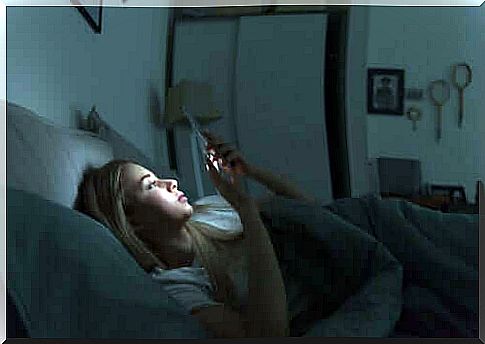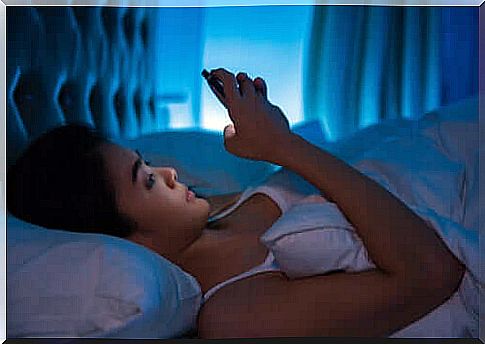Electronic Devices And Sleep Disorders

Several research studies have recently been published linking electronic devices and sleep disorders. In essence, they establish that such devices are potentially harmful to the natural rhythm of sleep and that they can significantly alter its quality.
The situation is worrying considering the fact that currently many people use mobile phones, computers and related devices on a daily and prolonged basis. Just as the number of people who can’t sleep without a bedside phone or who take their computer to bed to work is on the rise.
There is evidence that such behaviors can be problematic. The link between electronic devices and sleep disorders is a reality. The National Sleep Foundation of the University of California concluded that such devices result in shorter rest duration and significantly lower quality.

Artificial light and circadian rhythms
Circadian rhythms occur in living beings over a period of less than 24 hours. They are cycles that always follow the same order and that follow each other in phases. Among other aspects, these rhythms regulate sleep cycles. They are therefore equivalent to the better known biological clock.
Research conducted at the University of Connecticut, later published in the Royal Society’s Philosophical Transactions , indicates that artificial light has the potential to alter circadian rhythms. In particular, it can affect the sleep cycle.
The study establishes a direct relationship between electronic devices and sleep disorders. These devices work precisely with artificial light and sleep is extremely conditioned by circadian rhythms. The latter, in particular, make the organism more active in periods in which light is present and more passive in periods of darkness.
Circadian rhythms are largely determined by some specialized cells present in the retina. The illumination of the screens of electronic devices causes a distortion. In this sense, the daytime functions remain active even if it is night, while in reality they should be deactivated before going to sleep.
Evidence on the correlation between electronic devices and sleep disorders
The University of California also came to similar conclusions to those reported in the previous paragraph, but they went far beyond that. Researchers have found that blue light from computer screens and phones reduces the production of melatonin, a hormone that affects sleep quality. When melatonin levels are too low, getting to sleep is more difficult and also decreases its duration.
On the other hand, the bad habit of keeping your cell phone or computer next to you even when you are in bed prevents the reduction of neuronal activity. In other words, devices keep us alert, while what we need before sleep is just the opposite: to relax.
But the worst thing for those who leave the devices on is that while you sleep you can receive messages or notifications. Those who use it frequently tend to wake up immediately to see what it is. And even if they don’t play, there is a subjective tension created by the possibility that this could happen. And all this certainly does not favor optimal rest.

Side effects
Psychiatrist and psychoanalyst David Dorenbaum argues that the combination of electronic devices and sleep disorders has further consequences. He says that the intensive use of such devices makes it more difficult to remember dreams. Apparently, there would be an analogy between the world we see through the screen and the images of dreams.
A study of 1,000 Australian students aged 13 to 16 showed that device use was correlated with lower sleep quality, which in turn would have negative effects on mental health. The young people in the sample also had more symptoms of depression.
But electronic devices aren’t the real problem. The real problem lies in the misuse that is made of it. Optimal management of technological devices simplifies our life and facilitates various activities. On the contrary, their misuse makes the human being vulnerable and dependent.









